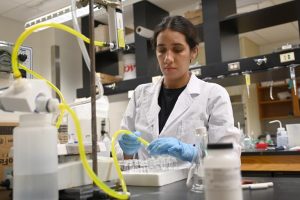
Oct. 29, 2024
Filtering out forever chemicals
Mizzou Engineers secured an EPA grant to pursue an innovative method to remove PFAS from water and degrade the chemicals.
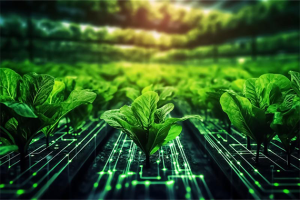
March 5, 2024
Engineer leveraging AI to help collaborators develop fungicides, prevent crop loss
Plant diseases destroy 125 million tons, or $220 billion worth of soybeans, corn, wheat and other crops in North America every year. Now, a Mizzou Engineer is leveraging artificial intelligence to help collaborators prevent that loss.
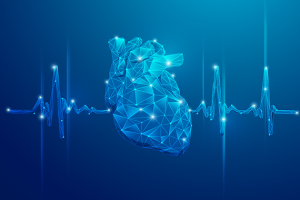
Feb. 23, 2024
Engineering a revolutionary method to measure cardiovascular stiffness
In a discovery that could revolutionize precision heart health care, Mizzou Engineering researchers have developed a way to measure cardiovascular stiffness—or the rigidity of arteries in your heart—based on data already being collected by traditional echocardiograms. “I consider this the most important work I’ve done in my career,” Professor Noah Manring said.

Feb. 6, 2024
$5 million NSF grant supports innovative approach to prevent foodborne illnesses
Like a silent saboteur, foodborne pathogens can sneak up and ruin your next meal. One of the biggest culprits is salmonella, a type of bacteria found in many foods that causes more than 1.3 million cases of foodborne illnesses annually according to the Centers for Disease Control and Prevention. Despite nationwide efforts, salmonella’s infection rates have remained nearly unchanged for the past 30 years. Now, MU is part of an interdisciplinary effort determined to change that after recently receiving a three-year, $5 million grant from the National Science Foundation’s Convergence Accelerator program.
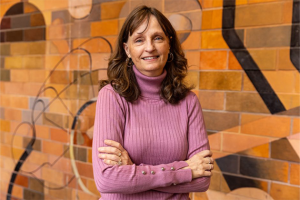
Feb. 1, 2024
Mizzou establishes commercialization hub with NSF award, $5.5 million agreement
The National Science Foundation (NSF) has selected MU as one of 18 U.S. academic institutions to receive an Accelerating Research Translation award. This award will be used to set up a Technology, Entrepreneurship and Commercialization Hub, supported by a four-year, $5.5 million cooperative agreement with the NSF.
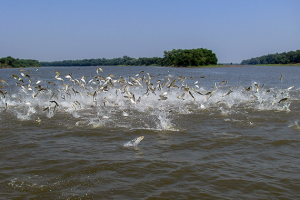
Jan. 23, 2024
Missouri Water Center helps secure three USGS National Competitive Grants
With support from the Missouri Water Center, three Mizzou researchers have been awarded highly competitive grants through the U.S. Geological Survey’s (USGS) Water Resources Research Act Program. The National Competitive (104G) Grants aim to promote collaboration between USGS and university researchers on significant national and regional water issues.

Dec. 1, 2023
Interdisciplinary team develops fast, reliable model to predict how seeds move
Playing an essential foundational role in an ecosystem, plants contribute to the well-being of human health by helping create resources like food and medicine. Therefore, to better understand how plants can maintain resiliency in the face of challenges like climate change, a team of researchers at the University of Missouri and Michigan State University recently collaborated to develop an innovative mathematical model that can provide fast and reliable predictions of how far wind can carry a plant’s seeds.
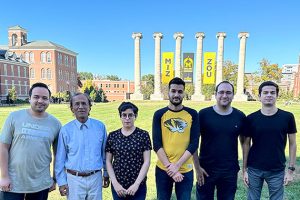
Oct. 25, 2023
Engineering team places first, third at inaugural segmentation challenge
A Mizzou Engineering team took first and third place at a new competition aimed to advance methods to not only detect but also trace the 3D shape of a specific type of brain lesion in newborns. The BONBID-HIE Lesion Segmentation Challenge was part of the International Conference on Medical Image Computing and Computer Assisted Intervention (MICCAI 2023) and sponsored by Boston Children’s Hospital and its Fetal-Neonatal Neuroimaging Developmental Science Center and Harvard Medical School.
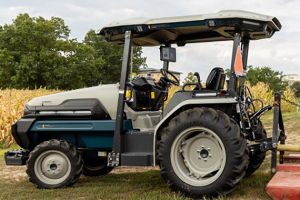
Oct. 11, 2023
Engineers to use autonomous tractor to study self-driving mechanisms
Two Mizzou Engineers are using Missouri’s first autonomous tractor to better understand self-driving mechanisms and how those systems can work with other technologies. Professors Prasad Calyam and Ming Xin are co-Principal Investigators on a Department of Agriculture grant that brought the tractor to Mizzou last month. Calyam is Greg L. Gilliom Professor of Cyber Security in the Department of Electrical Engineering and Computer Science, and Xin is Professor of Mechanical and Aerospace Engineering.
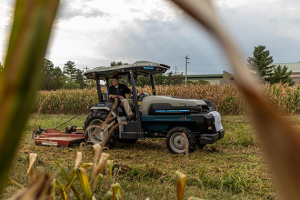
Sep. 6, 2023
Mizzou Engineering teams up with CAFNR to secure state’s first autonomous tractor
After more than a year of waiting, researchers at the University of Missouri welcome the arrival of one of the nation’s first-of-its-kind electric, autonomous tractors.